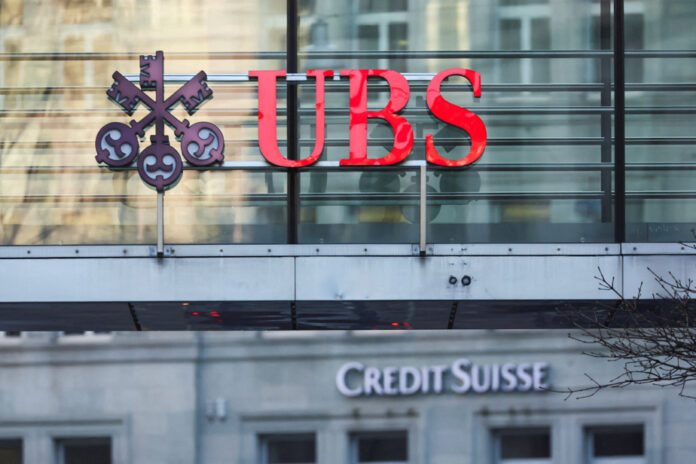(LONDON) Credit Suisse shares plunged 60.5% on Monday after banking giant UBS announced it would buy its struggling Swiss rival for nearly US$3.25 billion in an orchestrated deal. by regulators in an attempt to avoid further turbulence in the global banking system.
UBS shares also fell nearly 5% on the Swiss stock exchange.
Swiss authorities have pushed UBS to buy out its smaller rival after a central bank plan allowing Credit Suisse to borrow up to US$54 billion last week left investors and customers unhappy. Shares of Credit Suisse and other banks plunged last week after the bankruptcy of two banks in the United States raised questions about other potentially weak global financial institutions.
“Only time will tell how this forced marriage will be received,” said Neil Shearing, chief economist at Capital Economics.
Most of Credit Suisse’s problems are unique and unlike the weaknesses that led to the failure of Silicon Valley Bank and Signature Bank in the United States. Credit Suisse has faced a range of problems in recent years, including bad bets on hedge funds, repeated changes to its senior management and a spy scandal involving UBS.
Analysts and financial executives say collateral is stronger since the 2008 global financial crisis and banks around the world have ample liquidity and central bank support. However, concerns about the risks associated with the deal, the losses suffered by some investors and the fall in the stock market value of Credit Suisse could reignite fears about the health of the banks.
Crisis containment is a bit like a game of whack-a-mole, with new fires breaking out as previous ones are put out, Shearing said. “One of the key questions next week will be whether problems arise in other institutions or other parts of the financial system,” he said.
Credit Suisse is one of 30 financial institutions known as “global systemically important banks”, and authorities were concerned about the fallout from a possible bankruptcy.
“ An uncontrolled collapse of Credit Suisse would have incalculable consequences for the country and the international financial system ”, warned the President of the Confederation Alain Berset when announcing the agreement on Sunday evening.
UBS is bigger, but Credit Suisse wields considerable influence, with US$1.4 trillion in assets under management. It has major dealing desks around the world, caters to the wealthy through its wealth management business, and is a prominent M&A adviser. Unlike UBS, Credit Suisse weathered the 2008 financial crisis on its own.
The Swiss executive has passed an emergency ordinance authorizing the merger without shareholder approval.
As part of the transaction, approximately US$17.3 billion of Credit Suisse junk bonds will be erased. This transaction has raised concerns in the market for these bonds and other banks that hold them.
The combination of the two largest and best-known Swiss banks, whose history dates back to the mid-19th century, damages Switzerland’s reputation as a global financial center and puts it on the verge of having a single national banking champion.
The deal follows the collapse of two major US banks last week, which prompted a massive and frantic response from the US government to avert further panic.
In an effort to shore up the global financial system, central banks around the world announced coordinated measures to stabilize banks, including access to a lending facility allowing banks to borrow US dollars when needed, a practice widely used during the 2008 crisis.
Axel Lehmann, Chairman of Credit Suisse, called the sale to UBS a “decisive turning point”.
“This is a historic, sad and very difficult day for Credit Suisse, for Switzerland and for the global financial markets,” Lehmann said on Sunday, adding that the focus is now on the future and on what what was going to happen for the 50,000 employees of Credit Suisse, including 17,000 in Switzerland.
Colm Kelleher, chairman of UBS, hailed the “enormous opportunities” offered by the takeover and pointed to his bank’s “conservative risk culture” ― a subtle blow to the reputation of Credit Suisse, which is renowned for its bolder bets in search of higher returns. He said the combined group would create a wealth manager with over US$5 trillion in invested assets.
UBS officials have said they plan to sell parts of Credit Suisse or downsize the bank.
To support the operation, the Swiss central bank is granting a loan of up to 100 billion francs and the government is providing additional support of 100 billion francs if needed.
The President of the European Central Bank, Christine Lagarde, praised the “speed of action” of the Swiss authorities, declaring that they had “contributed to restoring orderly market conditions and guaranteeing financial stability”.
She reaffirmed that the European banking sector was resilient, had strong financial reserves and abundant liquidity. Credit Suisse’s parent bank is not subject to European Union supervision, but it does have entities in several European countries that are.
Last week, when the ECB raised interest rates, it pointed out that banks were in a totally different situation than in 2008, during the financial crisis, in particular due to stricter regulation.
Investors and banking industry analysts have yet to digest the deal, but at least one analyst has suggested it could tarnish Switzerland’s global banking image.
“The country’s reputation for prudent financial management, sound regulatory oversight and, frankly, gloom and boredom when it comes to investments, has been swept away,” said Octavio Marenzi, CEO of consulting firm Opimas. LLC, in an email.















